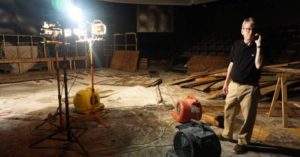By Shibani Mahtani
Reprinted from The Wall Street Journal
Dean Gladden breathed a sigh of relief two years ago when a $46.5 million renovation of the Alley Theatre, the first major improvement in the Tony Award-winning theater’s five-decade history, was finally completed.
Standing in the theater’s flood-damaged, putrid-smelling basement almost two weeks after Hurricane Harvey dumped trillions of gallons of rain on the nation’s fourth largest city, Mr. Gladden was almost breathless.
“I thought I was done, that the renovation was the last big project of my career,” Mr. Gladden said as he walked  through the pitch-dark theater. “And now, here we are.”
through the pitch-dark theater. “And now, here we are.”
Harvey’s record-setting floods hit Houston’s downtown theater district, just feet from a bayou, particularly hard.
Cultural buildings including the Wortham Center, home to the Houston Grand Opera and the Houston Ballet, and Jones Hall for the Performing Arts, where the Houston Symphony performs, suffered major water damage. But the Alley Theatre, inundated with over 10 feet of water, faces some of the most severe losses.
The Alley Theatre basement houses not just the complex’s electrical system but also a smaller, 310-seat stage, the Neuhaus Theatre; rehearsal rooms; changing rooms; and thousands of props and costumes. These were all but destroyed when black water—a combination of sewage, chemicals and rainwater—submerged the space.
As waters receded, new threats emerged. The seats in the Neuhaus Theater are covered in a thick layer of mold and will have to be completely ripped out. Mold has also started growing on a large number of props.
“It is just a huge mess,” said Mr. Gladden.
A layer of mold has started growing on the chairs at the Neuhaus Theatre, and must be ripped out and replaced. Mr. Gladden expects repairs to be in the millions, only a fraction of which will be covered by insurance.
A layer of mold has started growing on the chairs at the Neuhaus Theatre, and must be ripped out and replaced. Mr. Gladden expects repairs to be in the millions, only a fraction of which will be covered by insurance. Photo: Shibani Mahtani/The Wall Street Journal
.
On a recent visit, theater staff donning particulate masks and jumpsuits sifted through typewriters, dolls, skeletons and oversize Oriental rugs, while crews zipped around pulling out soaked equipment and pumping hot air into the area.
Alley Theater prop master Karin Rabe Vance, who has chronic lung problems, wore a ventilator as she worked 14-hour shifts in the basement.
“There’s just so much heartache—not physical and not because of my lungs, but emotionally, because of what has been lost,” Ms. Vance said, choking back tears. Of the times she has cried over the past week, the moment she said she remembers most vividly was when she spied a smiley-face mug on the floor, filled with flood water. She had made the cup for a cheerful stage manager.
When Harvey hit, a new play by Rajiv Joseph, “Describe the Night,” had been in rehearsals and was set to premiere at the Neuhaus Theatre on Sept. 15.
Mr. Gladden thought he might have to scrap the run entirely, but was able to move the production to the University of Houston’s 185-seat theater instead. Alley Theater’s office of 70 people, computer servers and other equipment also relocated to the university campus.
Tropical Storm Harvey’s impact on Texas has been catastrophic, but the city of Houston is faring worse than some others. Here’s the science of why Harvey has been especially devastating for the area. Photo: NASA
.
To stick to the original schedule, set designers had to redesign the play’s set for the new stage in just a week. “It was a race to get this done,” Mr. Gladden said. “Describe the Night” opened Friday to a full house, he said.
The Alley Theater will have to raise about $11 million in funding to restore the building, Mr. Gladden said, as its insurance policy only covers about $3 million in building repairs and another $4 million for equipment.
The two-year-old renovation took 14 months to finish and 70% of the $46.5 million cost came from private donors. But raising even $4 million in the current climate, given the competing needs of the city and the slump in the oil-and-gas industry, is an intimidating task.
Mr. Gladden has assigned a member of his staff to apply for available grants to help fund the renovation, including the National Endowment for the Humanities’ emergency grants for cultural institutions hit by Hurricanes Harvey and Irma. Applications for the federal grant opened last Thursday, allowing institutions to apply for up to $30,000 to preserve documents, artworks or structures damaged by the hurricane. The NEH gave out about $2 million in similar funding after Hurricane Katrina in 2005.
“The idea is to get the money to these institutions who need it as fast as possible,” said Paula Wasley, a spokeswoman for the NEH.
Mr. Gladden expects to reopen the main theater by November, in time for “A for Christmas Carol,” but the Neuhaus Theatre will take longer.
Still, staff—many of whom are also contending with personal losses of homes and more—are keeping it all in perspective. “The important thing is that we are all standing here, safe,” said Ms. Vance. “The rest of it—all this stuff—we can rebuild. It is just stuff.”
